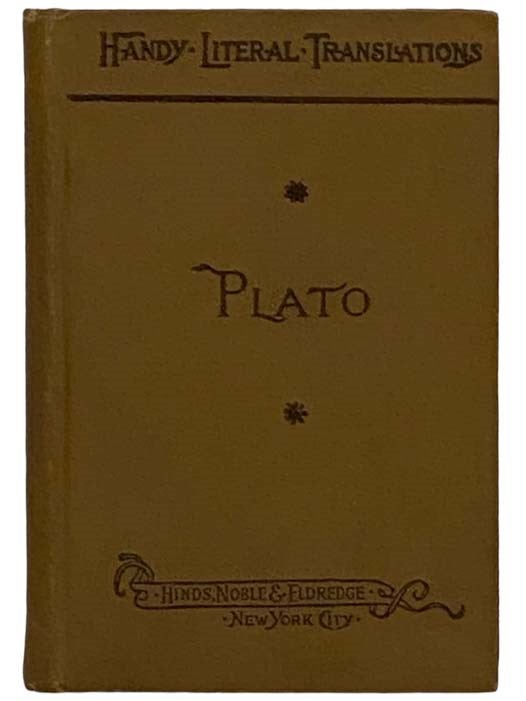
Plato's Apology, Crito and Phaedo of Socrates (Handy Literal Translations)
New York City: Hinds Noble & Eldredge. Small Hard Cover. Very Good / No Jacket. Item #2327289
No publisher date. Title on spine rubbed, pencil name and place on front free endpaper, pencil note on front free endpaper verso, front hinge starting, some pencil marginalia.
124 pp. 16 pages of publisher ads follow text. Light brown cloth boards. The Apology represents the speech that Socrates gave in his defense at his trial, and it gives an interpretation of Socrates' career: he has been a “gadfly,” trying to awaken the noble horse of Athens to an awareness of virtue, and he is wisest in the sense that he is aware that he knows nothing. Each of the other works in this group represents a particular Socratic encounter. In the Charmides, Socrates discusses temperance and self-knowledge with Critias and Charmides; at the fictional early date of the dialogue, Charmides is still a promising youth. The dialogue moves from an account in terms of behaviour (“temperance is a kind of quietness”) to an attempt to specify the underlying state that accounts for it; the latter effort breaks down in puzzles over the reflexive application of knowledge. The Cratylus (which some do not place in this group of works) discusses the question of whether names are correct by virtue of convention or nature. The Crito shows Socrates in prison, discussing why he chooses not to escape before the death sentence is carried out. The dialogue considers the source and nature of political obligation. The Euthydemus shows Socrates among the eristics (those who engage in showy logical disputation). The Euthyphro asks, “What is piety?” Euthyphro fails to maintain the successive positions that piety is “what the gods love,” “what the gods all love,” or some sort of service to the gods. Socrates and Euthyphro agree that what they seek is a single form, present in all things that are pious, that makes them so. Socrates suggests that if Euthyphro could specify what part of justice piety is, he would have an account. In his dialogue the Phaedo, Plato expounded a theory of literally innate ideas; humans, for example, have a conception of exact Equality, which, since it could not have been supplied by the senses, must have been acquired by the soul before it was embodied (see also reincarnation).--Britannica
Price: $20.00
